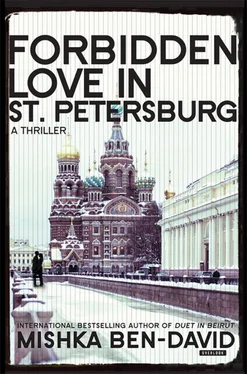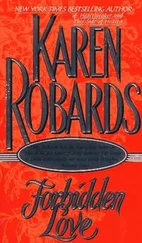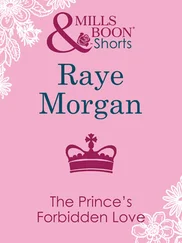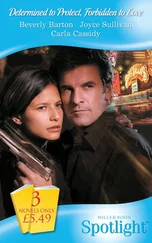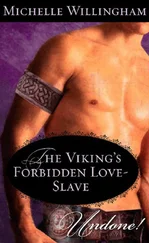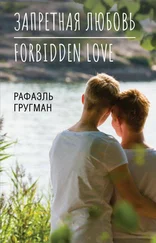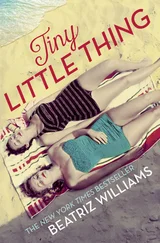And now not only didn’t I have to hurry, it was as if the city had control over me, or my new situation had taken control. I actually became that tourist, that Canadian businessman my documents said I was.
This struck home when I realized that the many policemen stationed in groups on every street corner, instead of making me apprehensive, gave me a feeling of security. That applied to the men in black uniforms as well as to those in grey with their big officers’ hats. I felt the same about the men who turned up towards evening in spotted battle uniforms and prison vans. They were on my side.
I understood this even more clearly when I started looking at Russian women. I don’t remember looking at girls in Israel after Orit left and I’d done very little of that before I knew her. Whereas Russian men were dressed in ways I was used to seeing in Tel Aviv, women of my age in St Petersburg wore lace party clothes to work, with stiletto-heeled shoes. The younger ones, those whom nature had endowed with long legs, wore very short shorts and tights, while those not blessed with such sylphlike figures walked around with highly exposed necklines, ignoring the danger of catching pneumonia from the frequent gusts of cold wind blowing in from the Gulf of Finland.
In the course of touring the city I came across Pushkin’s home on the embankment of the Moika River. There I saw inscribed the words he once wrote to St Petersburg: ‘I remember the wonderful moment when my eyes first saw you.’ I felt that for me too, without yet knowing why, these were wonderful moments that I would one day pine for. And that this future still held in store for me some magical moments.
After days of sightseeing I went to a local property agent who showed me a number of office buildings. He took me initially to Nevsky Prospekt, a street in which banks, airline companies, and foreign restaurants had branches. The buildings were well maintained and it was a place where one could merge into the crowd. But my fear of it being in a place where I could bump into tourists and acquaintances from Israel was also real, so I didn’t take it.
In the end, I decided to open the office on Liteyny Prospekt which runs from the centre to the River Neva. This elegant street with its imposing buildings on either side and a fair number of restaurants, shops and companies, appeared to be well suited to my purposes. It was within walking distance of the American and British consulates and other important hubs. At the quiet end of the thoroughfare, close to the river, there was far less business activity and the movement of pedestrians was more limited.
The building I was shown had kept the splendour of its early days and that attracted me. Most importantly, there was no concierge to report to the authorities on my comings and goings or the complete absence of visitors to my office. An old staircase led from the street into the building and on every landing there was a nameless door to yet another office. I decided that my trading company would be set up behind one of these doors on the third and last floor with its windows facing the street.
A few days after the furniture had arrived, and the computer and a copy machine had been installed in the office, I sent the Mossad a message informing them that I had set things up. I also sent an email to a number of companies whose addresses my controller, Ariel, had given me before I left Canada. Some we were interested in developing contacts with were in the former Soviet Union, some were unsuspecting European companies, and one was like mine: a front for the Mossad. The email, which had been composed in advance in Israel, announced that my Canadian trading company was opening a branch in St Petersburg with the objective of acting as a broker between firms in the former Republics of the Soviet Union and Canadian, American and European companies, with respect to a variety of products we specialized in.
Few firms bothered to respond and the other front company wrote in polite terms that in light of an earlier advice of my intention to open an office in Russia, they were surprised that it was only now that the announcement of its launch had arrived.
The Mossad’s dissatisfaction perplexed me a little; the state of Israel sent me on a mission–dormant but important. For a moment I even thought of activating the secret communications system by typing a complex password into the computer and explaining that I was OK. But the moment passed and with it the slight confusion I had felt.
The estate agent began showing me apartments in areas of new construction some distance from the centre of town. But I wanted a place that maintained the flavour of authentic old St Petersburg. The tours with the agent were a better way of getting to know the city than those I had made on my own in dozens of towns in which I’d operated. In none of them did I have the chance of going into houses and apartments and getting an impression of the local way of life but now I had the opportunity of discovering the ‘other face’ of a city. Beyond the sparkling and well-preserved façades there was poverty, neglect, and decay. Standing in the street, I could have been in Paris or Vienna at their best. The entrances were also relatively well kept. But a climb up the stairs revealed rusted railings and mildew on the walls. The apartments themselves exuded smells of mould and on the balconies overlooking the back, stores of crumbling wood, scrap metal and junk were visible.
In the end I chose an apartment in a large Stalinist building on Moskovsky Prospekt where the first floor was covered in big slabs of granite and the rest in square blocks of grey stone, though the window bays were decorated with pleasant inlays. I was happy to discover that there was a café on the ground floor that also served pastries and light meals. It was a branch of the Coffee-Khouze chain, an amusing transcription of Coffee House, with the Russian ‘X’ which transcribes as ‘KH’ but cannot be pronounced in English. It never failed to make me smile every time I saw it.
This building had another advantage: once again there was no concierge to check on my movements. The magnetic mechanism for the entrance to the building together with an elongated key to the door of my apartment, beyond which there was another internal door, only added to my feelings of security and domesticity. Opposite the building was Victory Park and the metro station that took me to the centre of town in minutes.
The apartment itself was more than a bachelor could possibly want or need. The living room was big, the bedroom spacious, and there was also a small study. The ceilings were high, the windows large and what mainly attracted me was that it was furnished with everything I required; from a sitting area and a large television–unfortunately for me, broadcasting in Russian only–in the living room, all the way to reading lamps. A renovation carried out on the apartment shortly before I moved in, gave me hope that the heating would work properly and that the taps would also be in order. I felt I could be comfortable in this place. The little creature inside me stopped chiselling a home for itself in the iceberg and even began to dig a tunnel to the outside world.
Somewhat to my surprise I discovered that, with the arrival of the cold of early autumn, I was drawing my new life into me and a distance I found difficult to measure was growing between me and my life there, in my warm homeland. I was merging into the mist rising from the canals and streaming in from the frozen sea, beginning to feel comfortable in my new environment. At the same time an ever thickening fog was settling between me and the land of the eternal sun where I was born and bred. I took advantage of the early mornings and late evenings to stroll in the park opposite. I meandered around a variety of trees, circled the lovely lake in the middle, and even introduced myself to some of the neighbours who rose early and ended the day exercising by running along the park’s footpaths.
Читать дальше
